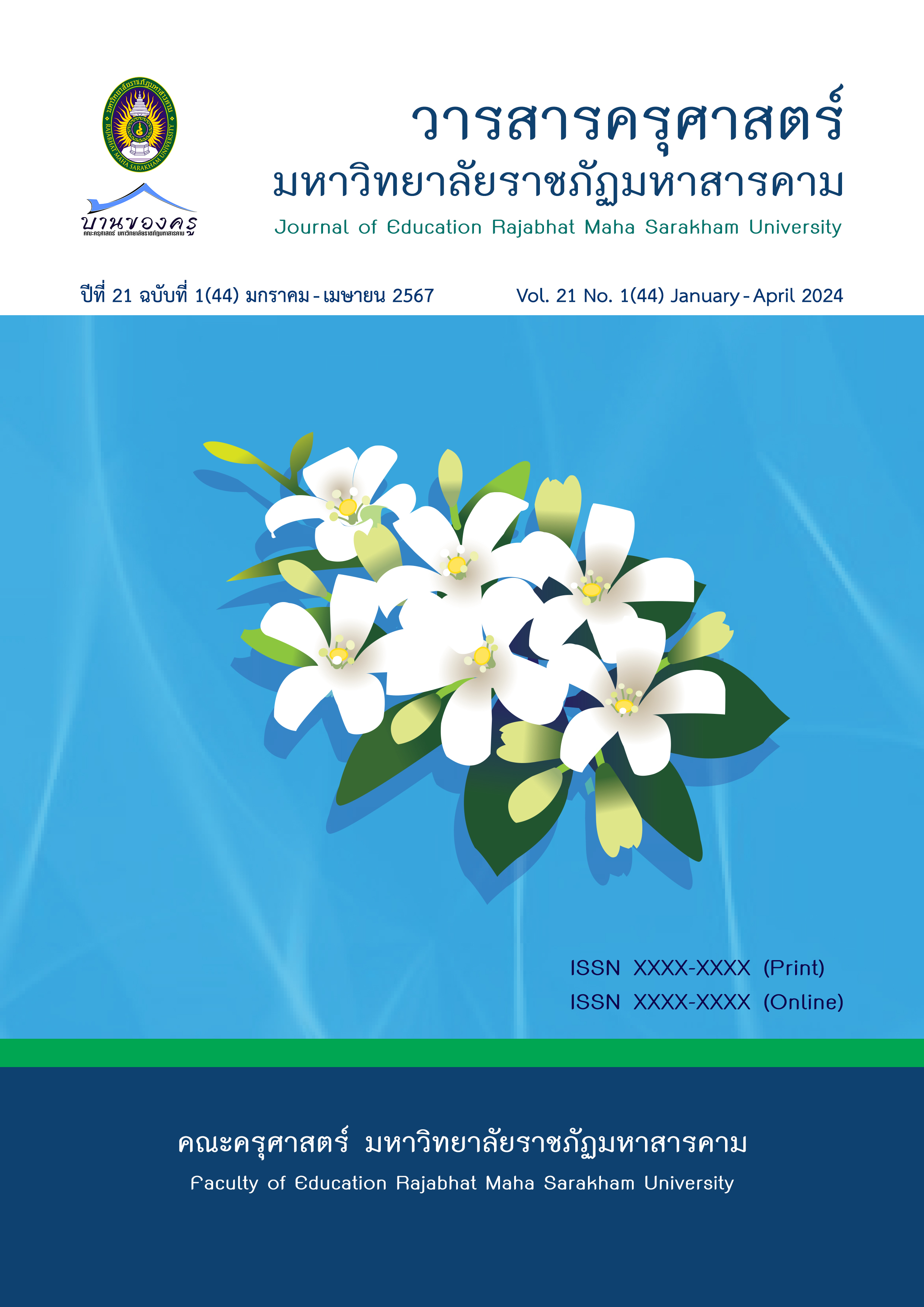Model of Educational management by using Local Wisdom of Educational Institutions under the Office of Mahasarakham Primary Education Service Area 2
Main Article Content
Abstract
The purposes of this study were to: 1) study the current condition and problems of educational management by using local wisdom of educational institutions. 2) Develop the model of educational management by using local wisdom of educational institutions. and 3) study the results of using the educational management by using local wisdom of educational institutions implemented in 3 phases as follows: Phase 1: Study of current conditions and educational management problems by using local knowledge of educational institutions, The target groups were 20 of school administrators and academic teachers, The tools used were interview forms and assessment forms, Phase 2: Develop an educational management model by using local knowledge of educational institutions, The target group was 12 experts, The tools used were the model assessment form, and Phase 3: Study the results of using the educational management model by using local wisdom of educational institutions, The target groups were 19 teachers and 182 students, with the total of 201 peoples. The tools used were assessment forms. The statistics used were percentage, mean, standard deviation.
The research results were found: 1) Current conditions and problems of educational management using local wisdom of educational institutions, divided into 4 aspects: (1) management (2) teachers (3) students and (4) community, The overall Assessment of the current state of education management problems by using local knowledge of educational institutions was at the highest level. 2) Draft an educational management model using local wisdom of educational institutions consisting of 4 components: (1) Principle and rationale (2) Objectives (3) Educational management using local wisdom local and (4) measurement and evaluation. Overall, the suitability and feasibility of the draft educational management model using local wisdom of educational institutions under the Maha Sarakham Primary Educational Service Area Office 2 were at the highest level. When considering each component, it was found that Every element is at its highest level. and 3) The overall results of the experimental use of local wisdom education management of educational institutions were at the highest level, and satisfaction was at the highest level.
Article Details

This work is licensed under a Creative Commons Attribution-NonCommercial-NoDerivatives 4.0 International License.
ข้อกำหนดเบื้องต้นที่ผู้นิพนธ์(ผู้ส่งบทความ) ควรทราบ
1. ผู้นิพนธ์ที่ประสงค์จะลงตีพิมพ์บทความกับวารสาร ตั้งแต่เดือนมกราคม 2563 เป็นต้นไป ให้ใช้รูปแบบใหม่ (Template 2563) โดยสามารถดูตัวอย่างได้ที่เมนู GUIDELINES
2. จะตีพิมพ์และเผยแพร่ได้ ต้องผ่านการประเมินจากผู้ทรงคุณวุฒิ (Peer Review)
3. การประเมินบทความโดยผู้ทรงคุณวุฒิ (Peer Review) เป็นแบบ Double Blind
4. การอ้างอิงบทความใช้หลักเกณฑ์ APA (American Psychological Association) คลิก
5. บทความถูกปฏิเสธการตีพิมพ์ ไม่ผ่านการประเมิน ผู้นิพนธ์ขอยกเลิกเองหรือชำระเงินก่อนได้รับการอนุมัติ ทางวารสารไม่มีนโยบายการคืนเงิน
References
กระทรวงศึกษาธิการ. (2561). หลักสูตรแกนกลางการศึกษาขั้นพื้นฐาน พุทธศักราช 2551 (ฉบับปรับปรุง พุทธศักราช 2560). กระทรวงศึกษาธิการ.
ธีรวัลย์ ศิลารัตน์. (2550). การจัดการความรู้ชุมชน. คณะมนุษยศาสตร์และสังคมศาสตร์ มหาวิทยาลัยราชภัฏรำไพพรรณี.
นิชานันท์ ตันสุริยา. (2558). การใช้ภูมิปัญญาท้องถิ่น ในการเรียนการสอนของครูในสถานศึกษาขั้นพื้นฐานสังกัดสำนักงานเขตพื้นที่การศึกษาประถมศึกษากาญจนบุรี เขต 3. [การค้นคว้าอิสระปริญญามหาบัณฑิต]. มหาวิทยาลัยราชภัฏกาญจนบุรี.
พลพักษ์ คนหาญ. (2558). รูปแบบการมีส่วนร่วมของโรงเรียนกับชุมชนในการนําภูมิปัญญาท้องถิ่นมาจัดการเรียนรู้ในสถานศึกษาขั้นพื้นฐาน. วารสารบัณฑิตศึกษา มหาวิทยาลัยราชภัฏสกลนคร, 12(56), 149-164.
รัชณี ดวงแก้ว. (2565). แนวทางการบริหารภูมิปัญญาท้องถิ่น ตามหลักสัปปุริสธรรม 7 ของผู้บริหารโรงเรียนขนาดเล็ก สังกัดสำนักงานเขตพื้นที่การศึกษาประถมศึกษานครสวรรค์ เขต 3. วารสารวิจยวิชาการ, 5(3), 147-162. https://doi.org/10.14456/jra.2022.65
ศรีจันทรัตน์ กันทะวัง. (2557). การพัฒนารูปแบบการเรียนการสอนภูมิปัญญาท้องถิ่นตามแนวการสอนเชิงประสบการณ์ โดยใช้กระบวนการมีส่วนร่วม สำหรับนักเรียนชั้นประถมศึกษา. [วิทยานิพนธ์ปริญญาดุษฎีบัณฑิต]. มหาวิทยาลัยสุโขทัยธรรมาธิราช.
สำนักงานคณะกรรมการการประถมศึกษาแห่งชาติ. (2542). ศูนย์วิชาการและภูมิปัญญาชาวบ้านกับการพัฒนาหลักสูตรท้องถิ่น. กองวิชาการ สำนักงานคณะกรรมการการประถมศึกษาแห่งชาติ.
อุรเคนทร์ คำฟัก. (2558). การนำเสนอยุทธศาสตร์การนำภูมิปัญญาท้องถิ่นมาพัฒนาหลักสูตรสถานศึกษาของโรงเรียนในอำเภอบรรพตพิสัย สำนักงานเขตพื้นที่การศึกษานครสวรรค์ เขต 2. [วิทยานิพนธ์ปริญญามหาบัณฑิต]. มหาวิทยาลัยราชภัฏนครสวรรค์.


